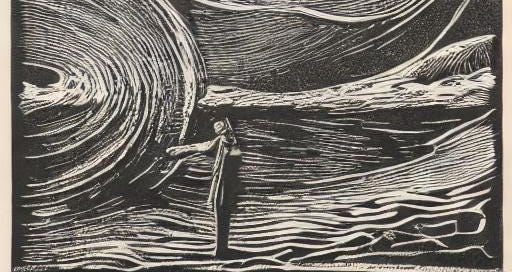Why care about God?
Why the solution to free will problems is not a solution to problems of agency
I often get asked why I have such a preoccupation with god, given my background. The truth is that I am not interested in god so much as I am in god-beliefs. For most people, god is the highest good in their lives. The centre of purpose around which their values orbit. Naturally, their conceptions of god bend their core beliefs into certain paths, which includes beliefs about agency. Free will beliefs emerged in worldviews where the presence of a certain type of god-belief necessitated free will beliefs. Without the gravitational pull of a god-shaped ontology, beliefs about agency won't bend into a free will orbit. So even in an age when the death of god has long been proclaimed, even atheistic concepts of agency may still orbit a god-shaped black hole.
Much of the ink spilled on exegeses about free will in the philosophical literature comes from atheists who had an obvious Christian upbringing. But the three main ideas associated with free will: freedom to do otherwise, the source of a given action, and responsiveness to reasons tend to get messily conflated in these ex-Christian free will accounts of agency. Whereas if you glance at ancient Greek idioms used to speak of agency, such as τὰ ἐφʹ ἡμῖν, τὰ οὐκ ἐφʹ ἡμῖν (what is up to us, what is not up to us), the idiom of free will is nowhere to be found. What the Greeks would have cared about was the source of an action and whether the agent is reasons-responsive. Freedom to do otherwise, which is so integral to free will, is not important in ancient Greek accounts. The ancient Greeks would see no problem with Frankfurt cases which posits counterexamples to the principle of alternate possibilities (PAP), which holds that an agent is morally responsible for an action only if that person could have done otherwise. Much like me, the ancient Greeks had no need or motivation for PAP to be true. That's because they lacked a conception of a tri-omni god capable of perfectly predicting and controlling the future. Much of Christian free will literature amounts to apologia that attempts to defend the goodness of god against accusations of his inactivity in the face of suffering. This is a common, though not exhaustive, conception of god found in Christian god-beliefs, as well as the god-beliefs typical in Judaism and Islam.
Therefore, the Christian solutions to the problem of free will tend to miss the mark that a solution to the problem of agency might require. After all, these Christian solutions to the problem of free will—Boethianism, Ockhamism, Molinism—are all aimed at absolving god and are completely useless for my purposes: I want to blame my enemies.





